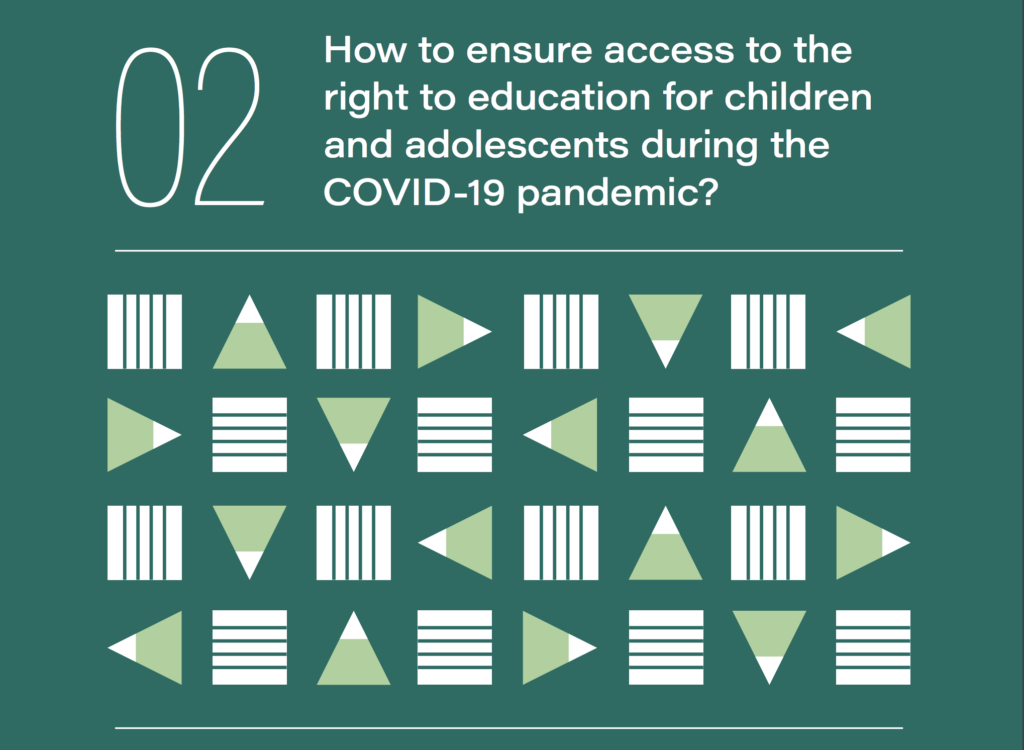 The Inter-American Commission on Human Rights (IACHR) has published a new practical guide on access to education in the context of COVID-19, the latest in a string of recent thematic publications and its second practical guide on the pandemic. [IACHR Press Release] The IACHR Rapid and Integrated Response Coordination Unit (SACROI) produced the guide in collaboration with the IACHR special rapporteurships on economic, social, cultural and environmental rights and on freedom of expression. See IACHR, How to Ensure Access to the Right to Education for Children and Adolescents during the COVID-19 Pandemic? (2020).
The Inter-American Commission on Human Rights (IACHR) has published a new practical guide on access to education in the context of COVID-19, the latest in a string of recent thematic publications and its second practical guide on the pandemic. [IACHR Press Release] The IACHR Rapid and Integrated Response Coordination Unit (SACROI) produced the guide in collaboration with the IACHR special rapporteurships on economic, social, cultural and environmental rights and on freedom of expression. See IACHR, How to Ensure Access to the Right to Education for Children and Adolescents during the COVID-19 Pandemic? (2020).
Impact on Education
The practical guide summarizes current access to education for children and adolescents in the Americas, noting that the “great majority” of countries in the region physically closed schools early in the pandemic and have yet to fully reopen. See id. at 2. While “many” States have provided online learning tools or are distributing educational programs through mass media outlets, pre-existing inequities have made it more difficult for some families and children to continue their education. See id. at 3. For example, food insecurity and access to or familiarity with technology contribute to ongoing gaps in education. See id. at 2, 4. Nearly 23% of people in the Americas lack access to the internet, although the rate is much higher in some individual countries. See id. at 4. In the Caribbean and Indigenous communities, in particular, inadequate access to electricity further complicates remote learning. See id. at 5.
Children and adolescents have also been negatively impacted by the reduction in psychosocial support, nutrition, health education, and other services they typically receive in schools. For some children and adolescents living in poverty, school closures have meant they no longer have access to their one reliable meal for the day. See id. at 6. Some countries have reported a possible 70% increase in online bullying among school age children. See id. at 4.
Separately, many challenges may delay or complicate a return to pre-COVID learning. Lack of necessary hygiene facilities and supplies are a significant obstacle to in-person learning, given that 40% of schools in the region had limited or no access to sanitary services. See id.
Practical Guidance to States
After reviewing the relevant human rights framework, the guide provides specific recommendations for respecting children’s rights and ensuring their access to education during the pandemic. See id. at 7-12. The guide notes that the Inter-American human rights instruments recognize the rights to education, recreation, non-discrimination, and special protection for children, and that the Inter-American Court of Human Rights has emphasized the importance of the principle of the best interests of the child. See id. at 7-8. The guide confirms that States retain their obligations to ensure access to education, regardless of whether non-State actors or companies are involved in providing educational services. See id. at 8. United Nations treaties and general comments provide additional legal support and detail regarding children’s rights to education, recreation, and other rights. See id. The guide centers the principles of non-discrimination and best interests of the child in framing its recommendations to States. See id. at 9.
Encouraging a “holistic” approach and urging States to focus on “structurally transforming education systems [to be] inclusive and resilient,” the guide lists 27 specific recommendations for State action. In addition to eight “general” recommendations, they cover: internet access and the digital divide; support from families and caregivers; safe reopening of schools; and food security. They range from the specific (“facilitate culturally appropriate activities and information and content in indigenous languages”) to the structural (“[e]nsure that the education system has sufficient budget”). See id. at 10.
Perhaps most critically, the guide urges States to adopt and implement plans and policies to target inequalities in access to education, including with regard to children living in poverty, Indigenous children, rural children, and children with disabilities. See id. Subsequent recommendations detail the necessary investments and programs for closing the digital divide, improving in-home supports and safety, enabling the reopening of schools, and meeting students’ nutritional needs.
Other Resources on Education and COVID-19
A handful of other statements and guides by human rights bodies have addressed children’s right to education in the pandemic. These include the IACHR’s April 2020 press release, Resolution 1/2020, and Resolution 4/2020. The United Nations Secretary-General published a policy brief on education in the pandemic, and UN Special Rapporteur on education issued a report on this topic. The African Committee on the Rights and Welfare of the Child includes recommendation on access to education in its Guiding Note to AU Member States on Children’s Rights during COVID-19. The UN Committee on the Rights of the Child issued a statement that identifies key concerns for children’s rights in the pandemic, including with regard to online learning.
Additional Information
Visit our COVID-19 webpage for a list of statements from human rights bodies related to the pandemic. Visit IJRC’s Online Resource Hub for more information on the Inter-American human rights system and to view our thematic guides on children’s rights; the right to education; and on economic, social, and cultural rights. To stay up-to-date on international human rights news, visit IJRC’s News Room or subscribe to the IJRC Daily.
